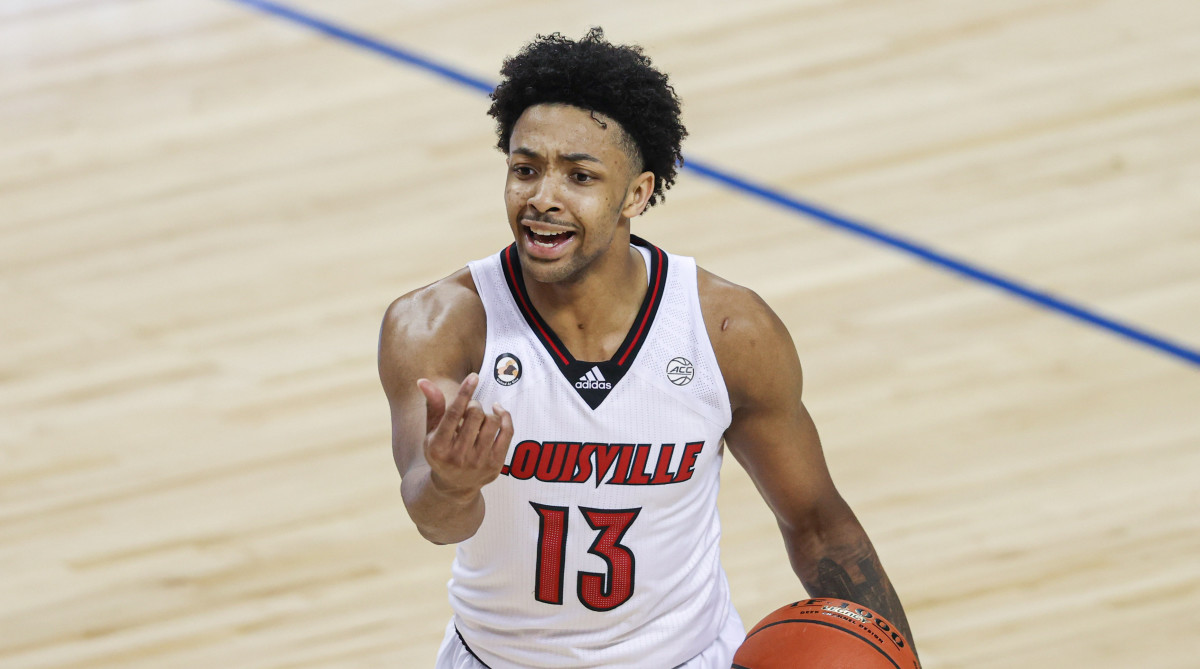Louisville's Snub a Stab in the Heart to America's Most Madness-Obsessed City
LOUISVILLE — March Madness is back! And everyone here in this bedrock basketball city is furious.
The metro area that annually has the highest viewership in America for the men's NCAA tournament is broken, bitter and bereft of basketball. Louisville had its hoops soul crushed by a confluence of unexpected events in the days leading up to Selection Sunday, and few people fully realized it until the results were on national TV at 6:37 p.m. local time.
The field of 68 teams was announced. And the Louisville Cardinals were not one of them. This was the snub nobody saw coming.
Louisville’s joy was stolen by bid thieves and bad losses and too few quality wins and two damaging pauses in a pandemic-shortened season—and, if you want to indulge in conspiracy theories, by the athletic director of the Cardinals’ most hated rival, who happened to chair the tourney selection committee. Milquetoast Mitch Barnhart of Kentucky has done almost nothing to stoke the fires of the rivalry during his 19-year tenure—until now. (Even if this wasn’t his doing.)
Sign Up to Play SI's Bracket Challenge and Compete For a Chance to Win Prizes.
Create Your Group Now | Official Rules
And—and—if you want the arsenic cherry atop a cyanide Selection Sunday sundae, former coach Rick Pitino is back dancing with Cinderella Iona. He’s still on the lam from NCAA sanctions, still a damn good coach and now less popular than ever in this city.
Pitino’s former team was officially No. 69—the first team out of the Big Dance. As such, the Cardinals may yet still get a chance to play. If a team drops out by 6 p.m. Tuesday for COVID-19 reasons, Louisville gets the call from the bullpen to take their spot.
While that leaves the door cracked, it’s a pretty dispiriting vantage point. “Miserable feeling,” was the description of one staffer.

For months on end, as the bracketology industry churns out its bogus (but fun) projected NCAA fields, Louisville was in. At no time until recently did that really appear to be in doubt—the Cardinals started 9–1, they finished with a winning record in the lordly Atlantic Coast Conference, they beat some brand names.
But upon closer inspection, there were flaws in the résumé. Beating Kentucky didn’t matter, because the Wildcats were terrible. Beating Duke twice didn’t move the needle, either. Seton Hall’s season tailed off, taking the helium out of that victory. A Western Kentucky overtime loss in the Conference USA final deprived Louisville of another win over an NCAA tourney team.
By the end, the Cardinals’ only victories over teams in the field were home games against Georgia Tech and Virginia Tech. That was offset by five losses to tourney teams, two of them horrific beatdowns coming off COVID-19 pauses—by 37 to Wisconsin and 45 to North Carolina. Throw in a bad loss to Miami and a 14-point ACC tourney defeat against the Duke team it beat twice, and Louisville quietly had slid onto the thinnest reaches of the bubble.
Then the bid stealers got busy. Georgetown won the Big East tourney Saturday night, which (unbeknownst to the public) pushed Louisville down to the last team in the tourney. And after midnight, Oregon State dealt the knockout blow by winning the Pac-12 tourney.
As the brackets were revealed, Louisville’s chances dwindled. Astute observers kept vigil on the No. 11 seeds, usually the last refuge of the at-large scoundrels.
Drake and Wichita State were in, ticketed for a First Four game. Next was Utah State, runner-up in the Mountain West Conference tournament. Fellow ACC team Syracuse was in, despite a 2–7 road record. And then the other First Four pairing dropped a battered blue-blood matchup of Michigan State and UCLA.
The last option was the last No. 10 seed. When the TV screen flashed Maryland in that spot, Louisville was out. The subsequent kick to the gut came in the final pairing of the night: No. 2 Alabama against No. 15 Iona.
Pitino was in. Louisville was out. Kentucky’s AD was in charge of the selections. Holy meltdown. The talk radio in town will be radioactive this week.
But these are things that Mitch Barnhart did not impact: The Cardinals missed too many games, had too few opportunities to improve their résumé (including two canceled matchups with Syracuse, which could have reversed which ACC team got that last bid). They didn’t play well in some big spots. Their losses coming off long pauses were avert-your-gaze hideous.
Pitino is a different part of the equation. His appearance in the field of 68 is the ultimate example of the broken NCAA crime-and-punishment system: He was fired at Louisville, went into exile in Greece, came back to America, got a new job and took his new team to the Dance all before any sanctions could be applied. (By the NCAA penalty matrix, he’s due to be suspended a number of games if the charges against him are upheld—up to half a season.)
In fact, nobody has been punished by the NCAA for the scandal that broke open in September 2017. That’s gross ineptitude, even with a federal investigation and a pandemic factored in.
But while Pitino is still coaching free of sanctions, so was Louisville playing this year without sanctions. Whatever comes the Cardinals’ way (a likely postseason ban) won’t be felt until the 2021–22 season—if then. So Louisville had its Stay Out of Jail Free Card to play this season, and blew it.
The plot twist was that nobody knew they’d blown it until the selection committee unveiled its work on live TV. In a sudden flurry of bracket reveals, it became clear. March Madness was canceled again, in the city that loves it more than any other.
SI’s tournament newsletter analyzes everything you need to know about the Big Dance: what just happened and what’s happening next. Sign up for Morning Madness here.
